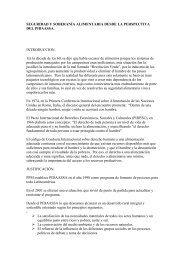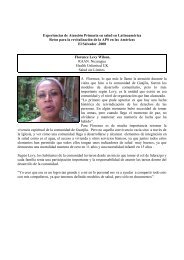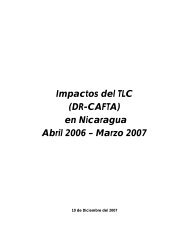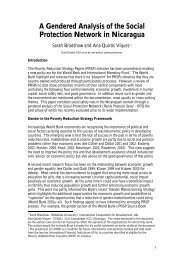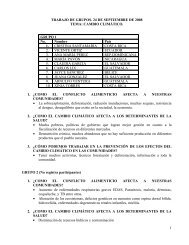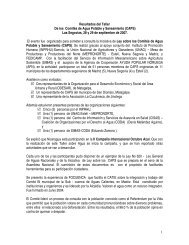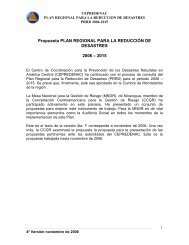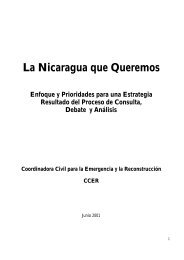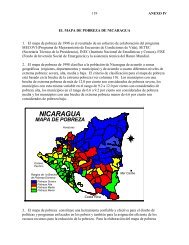Download - CISAS | Centro de Información y Servicios de AsesorÃa ...
Download - CISAS | Centro de Información y Servicios de AsesorÃa ...
Download - CISAS | Centro de Información y Servicios de AsesorÃa ...
You also want an ePaper? Increase the reach of your titles
YUMPU automatically turns print PDFs into web optimized ePapers that Google loves.
Observatorio Latinoamericano <strong>de</strong> Salud.Regarding the levels of employment, the companiesthat retain the same amount of workers and theones that had to reduce their roster are equivalent:each sector represents 40,4% of the totality, while15,8% incorporated new workers starting from the<strong>de</strong>velopment of the productive self-management.The two companies of Zanón and Pauny havedistinct mo<strong>de</strong>ls that constitute examples of feasibilityof this alternative mo<strong>de</strong>. The first, located in the ArgentineanPatagonia, has recovered its lea<strong>de</strong>rship inthe pottery market and <strong>de</strong>velops an interesting processof cooperation with the "mapuche" communitieswho participate in the elaboration of <strong>de</strong>signs for thenew lines of production.Pauny, alternatively, assumed the position of leadingcompany in the production of tractors. Startingoff with the assignment of reconditioning a single tractor,it rapidly overtook to produce 45 tractors monthlyand, at present, this quantity has increased to 70. Itsworkers earn the wage established in the collectiveagreement of the sector and, moreover, they have alreadydistributed the first profits.From Non-Salaried Work toProductive Self-Management:Some QuestionsThe experiences of recovering and self-managementof companies in Argentina put forward an unheardof problem, one which challenges creativity andthe capacity of innovation of whom are involved.From our focus on specifically health and work, wewould like to propose a set of questions that functionas the motors of our practices of intervention and research.The first has to do with the general orientationof the processes of productive self-management: is itpossible to think of them as processes of fragmentaryre-composition of the industrial mo<strong>de</strong>l previous toneoliberalism, or is it about the experiences of economicalinnovation that implicate productive dynamics,which transcend neoliberalism?Another question related to the first <strong>de</strong>als withthe organizational mo<strong>de</strong>ls that collective managementadopts: does the latter produce figures of stable lea<strong>de</strong>rshipof traditional nature or does it <strong>de</strong>velop complexmulti-referential processes which, in a context ofconstant change, allow the company to respond in aflexible manner, reshaping its internal organization in linewith the turbulences of its environment?The third question is connected with the processof intellectualization of work that self-managementrequires: which type of <strong>de</strong>vices favors the <strong>de</strong>velopmentof collective intelligence and the joint elaborationof strategies?The fourth question is directly linked to the managementof health and the working hazards: doesproductive self-management sponsor the <strong>de</strong>velopmentof a mo<strong>de</strong>l of epi<strong>de</strong>miological monitoring self-appliedto health and working security, or does it support amo<strong>de</strong>l of <strong>de</strong>legation of health care, as does the hegemonicmedical mo<strong>de</strong>l?The fifth question refers to the mo<strong>de</strong>s of articulationamid distinct experiences of social economy: isit possible to combine the resolution of quotidian problemsthat every experience of this sort entails withthe constitution of a new strategic temporality inwhich the sharing of inventions locally produced, theimplementation of projects of cooperation among variousproductive units, and the <strong>de</strong>sign of policies ofcommon action in relation to the range of governmental,commercial and financial organizations is possible?The sixth question concerns the subjectivityproblem: which <strong>de</strong>vices and by what means and operationsis the subjective figure produced (the self-managedworker or the freelance worker) and capable of<strong>de</strong>veloping the objective production in a recovered259




